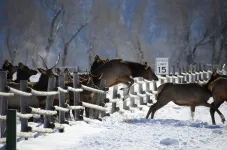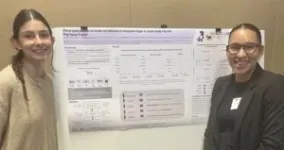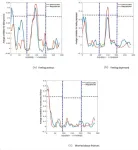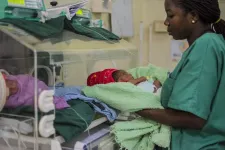(Press-News.org) Tucker and 174 colleagues, including members of the COVID-19 Bio-Logging Initiative, analysed global data from land mammals tracked by GPS devices. Tucker: “There were many media reports that nature was recovering during those first lockdowns. For example, cougars were roaming the streets of Santiago, Chile, but we wanted to know: is there any evidence of this? Or were people simply paying more attention to everything while being at home?”
Movements of mammals
Tucker and colleagues collated data from the movements of 43 different species of land mammals from around the world. In total, more than 2,300 individuals were included: from elephants and giraffes to bears and deer. The researchers compared the mammals' movements during the first period of lockdowns, from January to mid-May 2020, with movements during the same months a year earlier. “We saw that during strict lockdowns, animals travelled up to 73 percent longer distances in a period of 10 days than the year before, when there were no lockdowns. We also saw that animals occurred on average 36 percent closer to roads than the year before. This is probably because those roads were quieter during strict lockdowns,” said Tucker.
There are several explanations for these results: there were fewer people outside during strict lockdowns, giving animals the opportunity to explore new areas. “In contrast, in areas with less strict lockdowns, we saw that animals travelled shorter distances. This may have to do with the fact that during those lockdowns, people were actually encouraged to go into nature. As a result, some nature areas were busier than before COVID-19,” says Thomas Mueller, Senckenberg Biodiversity and Climate Research Centre and Goethe University Frankfurt, who designed the study together with Tucker.
Unique opportunity
The lockdowns provided a unique opportunity to study the effects of an abrupt change in human presence on wildlife. “Our research has shown that animals can respond directly to changes in human behaviour. This offers hope for the future, because in principle this means that making some adjustments to our own behaviour could have a positive effect on animals,” says Tucker.
END
Wild mammals moved farther during severe COVID-19 lockdowns
Human behaviour changed dramatically during lockdowns in the first months of the global COVID-19 pandemic, resulting in behavioural changes of land mammals.
2023-06-08
ELSE PRESS RELEASES FROM THIS DATE:
Study: Southern states may have borne brunt of COVID-19 mental health impact
2023-06-08
LAWRENCE — A new study appearing today in the peer-reviewed journal PLOS ONE shows how federal and state lockdowns and health mandates implemented to curb the spread of COVID-19 affected the mental health of people living in four U.S. geographic regions and affiliated with two major political parties.
A group of faculty, staff and student researchers at the University of Kansas generated data-based maps to look for spatial trends and communities with similar mental health and COVID-19 outcomes. ...
Researchers find an immune system ‘trip wire’ that detects COVID-19
2023-06-08
Inflammasomes make up an intricate system of molecular sensors that our bodies use to sound an alarm when an infection occurs. However, the mechanisms behind these sensors, which initiate responses to threats such as invading pathogens, and how they operate has been an area of intrigue for immunologists.
In a new study, University of California San Diego biologists describe a previously unknown way that the immune system detects certain viruses. The inflammasome immune protein known as CARD8, they found, can serve as a trip wire to detect a range of viruses, including SARS-Cov-2, which causes COVID-19.
Adding ...
Without fully implementing net-zero pledges, the world will miss climate goals
2023-06-08
Without more legally binding and well-planned net-zero policies, the world is highly likely to miss key climate targets.
In the new study, led by Imperial College London and published today in Science, researchers ranked 90% of global net-zero greenhouse gas emissions pledges as providing low confidence in their full implementation.
The researchers recommend nations make their targets legally binding and back them up with long-term plans and short-term implementation policies to increase the likelihood of avoiding ...
Breakthrough: Scientists develop artificial molecules that behave like real ones
2023-06-08
Scientists from the Radboud University have developed synthetic molecules that resemble real organic molecules. A collaboration of researchers, led by Alex Khajetoorians and Daniel Wegner, can now simulate the behaviour of real molecules by using artificial molecules. In this way, they can tweak properties of molecules in ways that are normally difficult or unrealistic, and they can understand much better how molecules change.
Emil Sierda, who was in charge of conducting the experiments at Radboud University: ‘A few years ago we had this crazy idea to build a quantum simulator. We wanted to create artificial ...
Global study highlights deaths from neonatal sepsis and steps to improve treatment
2023-06-08
A global observational study co-led by UCL (University College London), which involved more than 3,200 newborn babies suffering from sepsis in 19 hospitals in 11 countries, has shown that many newborns are dying because the antibiotics used to treat sepsis are losing their effectiveness.
The study, conducted from 2018 to 2020, found there was high mortality among infants with culture-positive sepsis (almost 1 in 5 across the hospital sites), and a significant burden of antibiotic resistance. The study has provided a wealth of high-quality data aimed at improving the treatment of newborn babies with sepsis.
The findings of the observational study ...
Why certain fish are left off the hook
2023-06-08
As warming waters threaten fish populations and disrupt fisheries around the world, it is critical to find ways to sustain fisheries while at the same time allowing those fisheries to remain economically viable to those who depend on them for their livelihoods. In the United States, commercial fishing employs 1.2 million Americans and generates more than $165 billion annually.
The primary way that the United States has protected its fisheries is through the Magnuson-Stevens Act, which was modernized in 1996 to foster the long-term biological and economic sustainability ...
In schools that could benefit most, building relationships is key to increasing capacity for nutrition education programming
2023-06-08
Philadelphia, June 8, 2023 – The US Department of Agriculture Supplemental Nutrition Assistance Program-Education (SNAP-Ed) provides nutrition programming to individuals with low income, including students and their families, through a network of community partners who implement the programs. Findings of a new study in the Journal of Nutrition Education and Behavior, published by Elsevier, suggest SNAP-Ed implementers could develop a school’s readiness for programming by concentrating efforts on cultivating relationships, program-specific capacity, and motivation at schools.
Lead author Erin McCrossan, PhD, Office of ...
Study uncovers how B cells react to skin cancer
2023-06-08
A new study that sheds light on how B cells react to skin cancer cells could pave the way for innovative therapy design.
The study, published today in Nature Communications and led by researchers from King’s College London, reveals that antibody-producing B cells in patients may be defective in responding to the most aggressive skin cancer, melanoma.
Antibodies are produced by B cells, a type of white blood cell, and are made to prevent and help fight infections. However, there is limited understanding about how B cells are prompted to respond to melanoma and why the antibodies they make are not effective.
Researchers ...
Universities in California, Arizona, and Nevada form consortium to address clean water access and sustainability challenges
2023-06-08
A novel collaboration between the University of Southern California (USC), the University of Arizona (UA), and the University of Nevada, Reno (UNR), has resulted in the Water Reuse Consortium. This groundbreaking partnership has been awarded a $12.3 million cooperative agreement for phase one of a three-phase $38 million program with ERDC-CERL to tackle pressing water challenges through innovative research, education, communication, and unprecedented collaborative efforts between government, local communities, industry, and academia.
The Water Reuse Consortium brings together ...
Henry Ford Health researchers launch clinical trial studying therapy aimed at causing brain cancer cells to self-destruct
2023-06-08
DETROIT (June 8, 2023) – Researchers in the Hermelin Brain Tumor Center at Henry Ford Health are leading a Phase I clinical trial studying the maximum tolerated dose of an oncolytic adenovirus, a mutated virus engineered to selectively replicate in and destroy cancer tissue, in combination with fractionated stereotactic radiosurgery among patients who are undergoing resection of a recurrent high-grade astrocytoma brain tumor.
“The participants in this study have progressive high-grade astrocytoma as well as glioblastoma, and are scheduled to undergo repeat surgery,” said Tobias ...
LAST 30 PRESS RELEASES:
The world’s largest brain research prize awarded for groundbreaking discoveries on how we sense touch and pain
Magnetofluids help to overcome challenges in left atrial appendage occlusion
Brain-clearing cells offer clues to slowing Alzheimer’s disease progression
mRNA therapy restores fertility in genetically infertile mice
Cloaked stem cells evade immune rejection in mice, pointing to a potential universal donor cell line
Growth in telemedicine has not improved mental health care access in rural areas, study finds
Pitt scientists engineer “living eye drop” to support corneal healing
Outcomes of older adults with advanced cancer who prefer quality of life vs prolonging survival
Lower music volume levels in fitness class and perceived exercise intensity
Of crocodiles, counting and conferences
AERA announces 2026 award winners in education research
Saving two lives with one fruit drop
Photonic chips advance real-time learning in spiking neural systems
Share of migratory wild animal species with declining populations despite UN treaty protections worsens from 44% to 49% in two years; 24% face extinction, up 2%
One in 20 babies experiences physical abuse, global review finds
Tundra tongue: The science behind a very cold mistake
Targeting a dangerous gut infection
Scientists successfully harvest chickpeas from “moon dirt”
Teen aggression a warning sign for faster aging later in life
Study confirms food fortification is highly cost-effective in fighting hidden hunger across 63 countries
Special issue elevates disease ecology in marine management
A kaleidoscope of cosmic collisions: the new catalogue of gravitational signals from LIGO, Virgo and KAGRA
New catalog more than doubles the number of gravitational-wave detections made by LIGO, Virgo, and KAGRA observatories
Antifibrotic drug shows promise for premature ovarian insufficiency
Altered copper metabolism is a crucial factor in inflammatory bone diseases
Real-time imaging of microplastics in the body improves understanding of health risks
Reconstructing the world’s ant diversity in 3D
UMD entomologist helps bring the world’s ant diversity to life in 3D imagery
ESA’s Mars orbiters watch solar superstorm hit the Red Planet
The secret lives of catalysts: How microscopic networks power reactions
[Press-News.org] Wild mammals moved farther during severe COVID-19 lockdownsHuman behaviour changed dramatically during lockdowns in the first months of the global COVID-19 pandemic, resulting in behavioural changes of land mammals.




